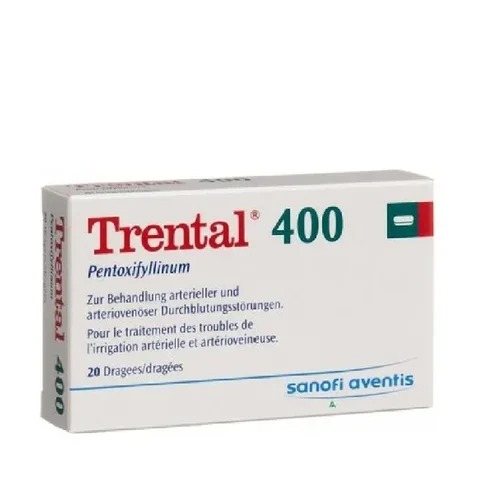goldenpharmacystore
Member since: 2024Are you or a loved one dealing with conditions like peripheral artery disease (PAD), intermittent claudication, or even certain types of dementia? If so, you might have heard about Trental 400mg. Let's delve into what Trental is, how it works, its potential benefits, and what you need to know before considering it as part of your treatment plan.
Understanding Trental 400mg:
Trental, also known by its generic name pentoxifylline, belongs to a class of drugs called methylxanthines. It works by improving blood flow by making red blood cells more flexible, allowing them to flow through smaller blood vessels more easily. This enhanced blood circulation can be particularly beneficial for individuals with conditions like PAD, where blood flow to the limbs is restricted, leading to symptoms like leg pain, cramping, and numbness.
Potential Benefits:
-
Relief from Intermittent Claudication: Intermittent claudication, characterized by leg pain during physical activity due to poor circulation, can significantly impact mobility and quality of life. Trental 400mg has shown promise in alleviating these symptoms, allowing individuals to engage in physical activities with less discomfort.
-
Management of Peripheral Artery Disease: PAD is a condition where narrowed arteries reduce blood flow to the limbs, increasing the risk of complications like tissue damage and infection. Trental 400mg, as an adjunct to lifestyle changes and other treatments, may help improve blood flow and relieve symptoms associated with PAD.
-
Cognitive Benefits: Some studies suggest that Trental 400mg may have neuroprotective effects and could potentially aid in the management of certain types of dementia. Improved blood flow to the brain may help support cognitive function, although further research is needed in this area.
Important Considerations:
-
Consultation with Healthcare Provider: Before starting Trental 400mg or any new medication, it's crucial to consult with a healthcare provider. They can assess your medical history, evaluate potential drug interactions, and determine if Trental is appropriate for your condition.
-
Side Effects: Like any medication, Trental 400mg may cause side effects, including nausea, dizziness, and stomach upset. It's essential to be aware of these potential reactions and report any concerning symptoms to your healthcare provider.
-
Dosage and Administration: Trental 400mg tablets are typically taken orally, usually with meals to minimize stomach upset. Dosage may vary depending on the individual's condition and response to treatment, so it's essential to follow your healthcare provider's instructions carefully.
-
Monitoring and Follow-Up: Regular follow-up appointments with your healthcare provider are essential to monitor the effectiveness of Trental 400mg and address any concerns or changes in your condition.
Final words:
Trental 400mg offers a potential avenue for improving blood circulation and managing symptoms associated with conditions like PAD, intermittent claudication, and certain types of dementia. However, it's essential to approach its use with caution, under the guidance of a healthcare professional, to ensure its safety and effectiveness for your specific needs. If you have any questions or experiences to share regarding Trental 400mg, feel free to join the discussion below. Your insights could be invaluable to others navigating similar health challenges.




